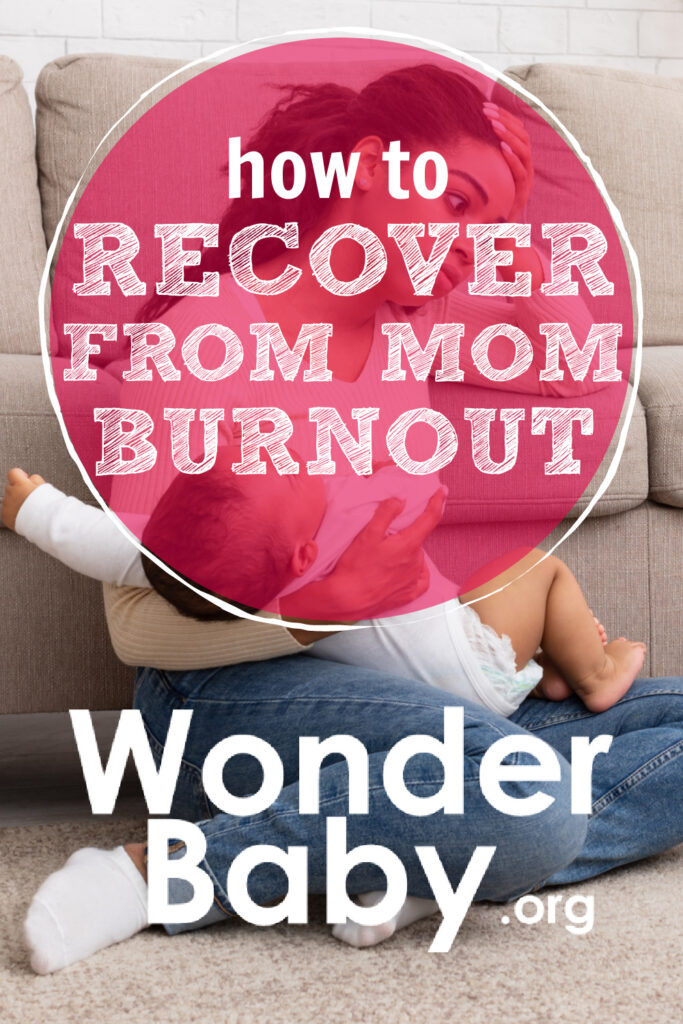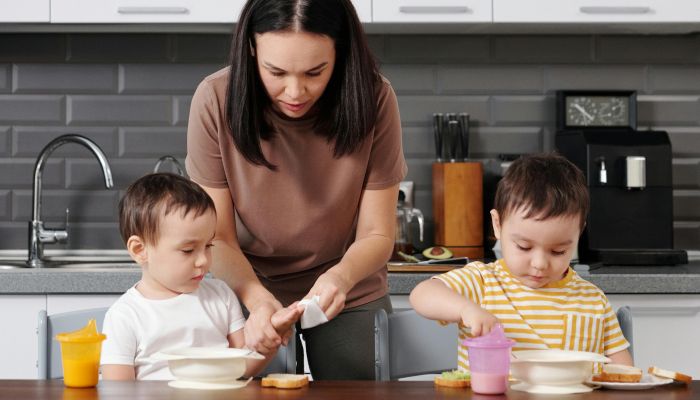How to Recover From Mom Burnout

- Mom burnout is normal, and there is a lot you can do to prevent it.
- The most common symptoms of burnout are exhaustion, feeling overwhelmed, disconnection, and despair.
- Routine, mindfulness, and self-compassion help moms recover from burnout.
- If you are experiencing chronic burnout, seek professional help from a therapist.
If you’re a mom, you know the job is never done. There’s always something to do, whether it’s taking care of the kids, the house, or other responsibilities. If you’re working outside the home, you’re also juggling motherhood’s demands with your job’s needs.
It’s no wonder that many moms experience mom burnout, which is more common than you might think. A recent study found that nearly 9.8 million working moms are feeling burned out. That’s a lot of moms who are struggling to keep up with the demands of motherhood.
If you’re feeling burned out, you’re not alone. There are things you can do to avoid it and also repair it. But first, it’s important to understand what causes burnout and that burnout is normal.
Is It Normal for Moms to Feel Burned Out?
Yes, it’s normal for moms to feel burned out. Parenting is a very demanding job. Add the following stressful circumstances, and mommy burnout is sure to follow.
No Break
Parenting is 24/7/365. The return on your investment of time and energy is limited. You don’t get paid except for the occasional hug, and the work of parenting is never complete. There’s always something that needs your attention.
Additionally, if you have a job outside the home, you are constantly shuffling between your responsibilities at home and work.
Mom’s Needs Come Last
Another reason why moms might feel burned out is that they often put their needs last. Moms are so busy caring for everyone else that they often forget to care for themselves.
Many mothers forget to eat, drink water, or rest because the demands of others are high. This can lead to feelings of resentment and burnout.
Lack of Support
Many women parent alone, without the support of a partner. They have to be the united front for their children, which includes protection, nurturing, academic support, financial support, and social support. That’s a lot on one person’s plate.
Couples without family or friends around may feel isolated and experience burnout because there isn’t anyone to help with childcare. In addition to physical support, moms need emotional and mental health support to preserve their well-being. A mother without a social rock often experiences burnout at a higher rate than those who have help nearby.
Self-Care Challenges
Self-care is different when you become a parent. You have less time, energy, and money to spend on surviving and thriving.
Since the demands of parenting are high, self-care for mom tends to disappear. It’s common for moms to feel guilty about taking care of themselves if it’s at the expense of time with their children. Guilt often stands in the way of a mother giving herself what she needs.

What Are the Symptoms of Mom Burnout?
You should be aware of a few symptoms of mom burnout. If you’re experiencing any of these symptoms, taking action is essential to prevent mom burnout.
Symptoms of mom burnout can include:
- Feeling overwhelmed
- Negative thoughts
- Always seeking a break
- Exhaustion
- Anxiety
- Irritability
- Escape fantasies
- Lack of patience with others
- Low or no empathy
- Lack of joy or pleasure in what once delighted you
- Not leaving home with kids
- Strong desire for isolation
- Lack of focus, concentration, and memory
- Using caffeine and/or alcohol to cope
Burnout doesn’t happen overnight. It occurs after a gradual increase in stress that is sustained over time. Burnout may occur after a few weeks of being a new mom to a newborn baby, particularly if mom isn’t sleeping well or fueling her body with nutritious foods.
It’s also possible for burnout to take years to accumulate. Some parents experience burnout when their child is older, and they are involved in several activities.
When mom is in a burnout phase, she has typically been experiencing chronic stress for a while. Her mental health may be teetering, and she doesn’t have the support to take care of herself.
It’s at this point burnout needs to be addressed and treated. If not, it could turn into chronic burnout, negatively impacting her mental health, well-being, physical health, and relationship with her children.
How Can Moms Prevent Feeling Burned Out?
Parenting your children takes most of a mother’s mental and physical energy to meet the consistent needs of her children. It can be challenging to think about anything but what needs to be done or how to fit it all in. This constant mental gymnastics frazzled nerves and can feel utterly overwhelming.
It’s healthy to take care of yourself, even if that means you say no to a family event or yes to a massage. Thankfully, you can do a few things to avoid mom burnout so you can sustain your energy and sanity over time.
Take Care of Your Own Well Being
This means making time for yourself, even if it’s just a few minutes each day. Your self-care is unique to you and you are in charge of creating a space for yourself to just be.
Make sure to schedule time for self care, even if it’s to take a bath, read a book, or take a walk. Start small and work your way up to things that take more time and energy.
Take Care of Your Basic Needs
Make sure you get enough sleep, eat a healthy diet, and exercise. This can be tough with children, but you can set boundaries with your children and provide a positive example of what taking care of yourself looks like.
Don’t Compare Yourself
Mothers are all unique and have particular circumstances, backgrounds, and approaches that lead to different parenting and self-care outcomes. Try to focus on your life and your needs instead of comparing them to what others have or what they are doing.
Ask for and Accept Help
This can be difficult for some moms, but it’s essential to ask for help when needed. Whether it’s asking your partner for help with the kids or hiring a babysitter to give you a break, don’t be afraid to ask for help.
Build a Support System
Meet and commune with other moms who can understand what you’re going through. Camaraderie helps you feel validated in your experience, and motherhood can feel isolating. A community of moms can support connection and well-being.
Set Realistic Expectations
Society puts a lot of pressure on moms to be perfect. This leads most moms to feel overwhelmed and exhausted.
But the truth is, there’s no such thing as a perfect mom. Try to let go of perfectionism and give yourself some grace. You can help yourself by turning off social media, focusing on one thing at a time, and letting go of mistakes.

Tips on How to Recover From Mom Burnout
If you’re already experiencing mom burnout, it’s vital to take action to prevent it from getting worse.
Take a Break
This might mean taking a vacation, a staycation, or just a few hours to yourself. Breaks don’t have to be long, but they do need to be frequent.
Practice noticing silence or calm and intentionally taking a break from the responsibilities at that moment. A quiet drive or moment in the bathroom is better than nothing.
Re-establish Routine
Establishing a daily routine for yourself can be restorative. Your routine can include the basics, such as brushing your teeth and washing your face in the morning and before bed.
Ensure you are intentional about getting enough sleep and maintaining a healthy diet. While recovering from burnout, go to bed early or make your evening restful.
Exercise
Movement is one of the best stress-busters out there. All you need to do is get your heart rate up a few times a day. Try 25 jumping jacks, a fast walk around the block, or ten pushups.
This little amount of movement helps the nervous system relax, so your stress response goes down. Work up to 30 minutes of exercise daily to see more long-term benefits.
Talk About It
Parenting is tough. Having a supportive friend or family member to turn to when you feel overwhelmed can help you work through stressful situations. Talking about it will help with problem-solving and support connection and community, which we all need.
Consider Learning More About Gentle Parenting
Gentle parenting is an approach that supports a calm environment for the family to thrive. One of the first things you learn in the gentle parenting approach is regulating your emotions. The idea is that you, as the parent, need to be healthy and whole to parent in a supportive way.
Stop Apologizing For Being a Human Being
Women have been socialized to do more for others than for themselves. This leads to inappropriate feelings of guilt and shame anytime a mother tries to care for her needs.
Remind yourself that you are human like everyone else. If everyone else has a right to eat, sleep, move, connect, and enjoy, you do as well.
Practice Mindfulness
Mindfulness is a process of paying attention on purpose. You can focus on one thing outside of you or a feeling you have inside of you. The point is to concentrate on one thing at a time and experience it to its full potential.
Burnout is common among mothers because they frequently multitask. Moms often feel scattered and stressed with all they have on their plate. Mindfulness can remind you to slow down and do one thing at a time, which reduces anxiety and improves well-being.
If you are interested in practicing mindfulness in a meditation capacity, you can download a meditation app or look up meditation videos on YouTube. Incorporate a few minutes of meditation daily to reduce stress and approach your life more efficiently and with ease.
Practice Self Compassion
Moms can be hard on themselves. Mom guilt and shame over mistakes create stress if felt for prolonged periods. Self-compassion practice will help unhook you from the grip of challenging thoughts and feelings.
Self-compassion is accepting what is and providing empathy and validation to yourself. Self-compassion helps parents fill up their empty cup.
When to Seek Help From a Professional
If you’re still struggling with mom burnout and feel more depressed or disconnected, it might be time to seek professional help. The parenting transition can be challenging, and a professional can help support and guide you. This could mean meeting with a therapist or counselor who can help you manage your stress and anxiety.
If you feel out of control, notice a desire for violence, or begin to neglect your children, seek help immediately, as this is a warning sign of severe burnout.
If you’re struggling with mom burnout, don’t be afraid to reach out.

Related Posts

Parenting
Sensory Wall Art: 5 Tips to Create a Room Your Blind or Low-Vision Child Will Love
Even if your child can’t see their surroundings, personalizing and decorating their room with thoughtful, sensory-friendly design can make a big difference in their confidence, independence, and joy.

Parenting
4 Tips to Manage Twins Alone as a Single Parent
Taking care of twins alone as a single parent can feel overwhelming. Learn practical ways to help lighten the load.

Parenting
How to Manage Twin Escalation Syndrome
Discover effective strategies for managing twin escalation syndrome, including promoting individuality and fostering positive interactions.